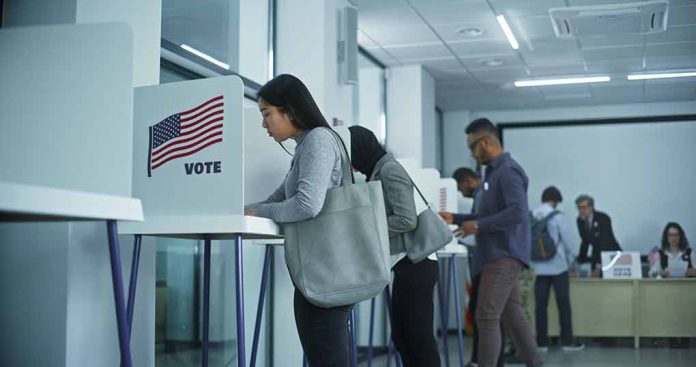
The Supreme Court has upheld parts of Arizona’s voter citizenship proof law, sparking debate over election security and voter access.
At a Glance
- Supreme Court allows Arizona to enforce proof of citizenship for new voter registrations
- Ruling is a 5-4 decision, with conservative justices favoring full enforcement
- RNC Chairman calls it a “major victory for election integrity”
- Critics worry about potential voter disenfranchisement
- Decision comes weeks before a close presidential election
Supreme Court Delivers Mixed Ruling on Arizona Voting Law
In a significant decision affecting election procedures, the U.S. Supreme Court has partially upheld Arizona’s controversial voter citizenship proof law. The 5-4 ruling allows the state to enforce a requirement for proof of U.S. citizenship on new voter registration forms. However, the court rejected efforts to block already registered voters without such proof from voting in federal elections or by mail.
This decision comes at a critical time, just weeks before a highly anticipated presidential election, and amid ongoing Republican efforts to implement stricter voter identification laws across the country. The ruling has reignited the debate over the balance between election security and voter accessibility.
Supporters Hail Victory for Election Integrity
Proponents of the law, including the Republican National Committee (RNC), have lauded the Supreme Court’s decision as a crucial step in safeguarding the integrity of elections. RNC Chairman Michael Whatley expressed his approval of the ruling, emphasizing its importance in ensuring that only U.S. citizens participate in the electoral process.
“[This is] a major victory for election integrity that upholds a simple principle: American elections must be decided by American citizens.” – RNC Chairman Michael Whatley
The decision aligns with broader Republican initiatives to strengthen voter identification requirements across the nation. Two dozen Republican state attorneys general filed a friend-of-the-court brief in support of the RNC’s request, underscoring the party’s unified stance on this issue.
Critics Express Concerns Over Voter Disenfranchisement
Despite the enthusiasm from supporters, the ruling has raised concerns among voting rights advocates and some election officials. Critics argue that such stringent requirements could potentially disenfranchise eligible voters, particularly those from marginalized communities who may face challenges in obtaining the necessary documentation to prove their citizenship.
The US Supreme Court has partially reinstated Arizona's proof-of-citizenship law for voter registration. People without proof of citizenship can still register as federal-only voters using the federal form, but can no longer do so with the state's form. https://t.co/MLbwMdRuhE
— Jeremy Duda (@jeremyduda) August 22, 2024
Arizona Democratic Secretary of State Adrian Fontes acknowledged the court’s decision while emphasizing the importance of maintaining voter access. In a statement, Fontes said his office “will implement these changes while continuing to protect voter access.” This response highlights the delicate balance officials must strike between implementing the new requirements and ensuring all eligible voters can participate in the democratic process.
Impact on Arizona Voters and Future Elections
The immediate impact of this ruling on Arizona voters remains to be fully understood. As of July 1, 42,301 voters in Arizona were registered for only federal elections, and their status for future presidential elections remains uncertain. The decision allows the state to enforce the citizenship proof requirement for new voter registrations, but it does not affect those already registered without such proof.
Thursday's U.S. Supreme Court ruling on proof of citizenship requirements for voting in Arizona changes … nothing. https://t.co/ffac8EKJZl via @azcentral
— Laurie Roberts (@LaurieRoberts) August 22, 2024
This ruling is part of an ongoing legal battle over voter registration requirements in Arizona, a key swing state. The state has a two-track voter registration system with different requirements for state and federal forms. While state law requires proof of citizenship for state and local elections, a 2013 Supreme Court ruling mandated that Arizona accept federal forms that do not require such proof.
As the nation approaches a pivotal election, the implementation of these new requirements and their potential effect on voter turnout will be closely watched. The decision underscores the ongoing tension between efforts to secure elections and ensure broad voter participation, a debate that continues to shape America’s electoral landscape.
Sources
- Supreme Court grants GOP bid to require citizenship proof for some Arizona voters
- US Supreme Court partly revives Arizona’s proof of citizenship voter law
- Supreme Court limits Arizona voting without citizenship proof
- Arizona may require proof of citizenship on state voter forms for now
- Amy Coney Barrett Breaks With Supreme Court Over Granting Republicans’ Wish






